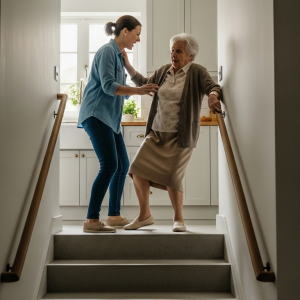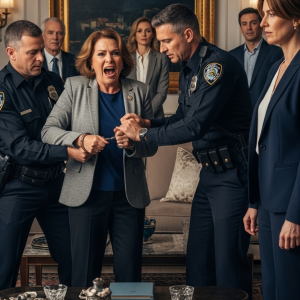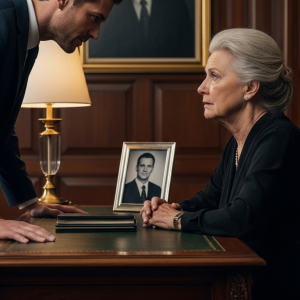The living room was Clara’s sanctuary. Sunlight, soft and golden, streamed through the large picture window, illuminating the warm grain of the teak and rosewood furniture that filled the space. Each piece was a memory, a whisper from her grandfather, a renowned architect who had taught her that true beauty lay in clean lines, honest materials, and functional grace.
Her fingers, slick with lemon oil, traced the elegant curve of an Eames lounge chair, its black leather worn to a supple softness over decades of use. It was more than a chair; it was the seat where her grandfather had sketched his final blueprints, the place where she had curled up as a child, listening to his stories of form and function. This room was not a collection of objects; it was a living history.
The sudden, sharp chime of the doorbell shattered the tranquility. Clara sighed, wiping her hands on a soft cloth. She already knew who it was. The scent of an expensive, overpowering perfume preceded Margaret into the room, followed by the clatter of heels on the hardwood floor and the jangling of gold bracelets.
“Clara, darling!” Margaret chirped, her eyes scanning the room with a familiar, barely concealed disdain. She was dressed in a vibrant floral dress that seemed to be at war with the room’s quiet elegance. “Still living in this… dusty old museum, are we? I was just at the showroom, and you wouldn’t believe the magnificent velvet sectionals they have. So plush! It would make this place feel so much more… wealthy.”
Clara forced a tight smile. “Hello, Margaret. I’m quite fond of my ‘museum.’ Everything here has a story.”
“Oh, I’m sure it does,” Margaret said, waving a dismissive hand. “Stories of the past. A young couple like you and David should be looking to the future! To luxury! This… this is just secondhand furniture, dear. It makes you look like you’re struggling.”
Later that evening, after Margaret had finally departed, leaving a cloud of perfume and quiet tension in her wake, Clara found herself polishing the same spot on the Eames chair. David entered, wrapping his arms around her from behind and resting his chin on her shoulder. He could feel the stiffness in her posture.
“She means well, you know,” he said softly, his voice a familiar refrain in this ongoing conflict.
Clara stopped her work, her voice weary. “David, I know you love your mother. But she doesn’t see furniture. She sees status symbols. She looks at my grandfather’s legacy and sees a yard sale.” She turned to face him, her eyes pleading. “Good intentions without knowledge, without respect… that’s just a pretty name for destruction.”
David kissed her forehead, a peacemaker caught between two worlds. “She just wants to help, that’s all. She’ll never change.” He didn’t realize how prophetic those words would be.
The weekend getaway was David’s idea—a much-needed escape to a quiet coastal town. For two days, Clara was free. She walked on the beach, breathed in the salty air, and forgot about the judgment and the quiet pressure that awaited her back home. She and David reconnected, their laughter echoing over the sound of the waves. They felt like a team again.
Their return on Sunday evening was peaceful, the car filled with comfortable silence as they pulled into their driveway. Nothing seemed amiss. The house was dark and quiet, just as they had left it. David unlocked the door, and Clara stepped inside, reaching for the light switch.
The moment the room was flooded with light, Clara froze. The air was wrong. It smelled of chemical polish and new fabric, not the familiar scent of old wood and lemon oil. And the room… the room was gone.
Her sanctuary had been grotesquely violated. In place of her grandfather’s masterpieces stood a collection of monstrous furniture. A gaudy, crushed-velvet sofa in a shade of electric blue dominated the space. Gilded tables with faux marble tops sat where her sleek, minimalist pieces once had. The warm, organic soul of the room had been ripped out and replaced with a cheap, glittering imitation of wealth.
From the hallway, Margaret appeared, beaming with self-satisfaction, her hands clasped together as if awaiting applause.
“Surprise!” she announced, her voice booming in the alien space. “What do you think? I decided you two deserved a proper home, a place that reflects David’s success! I’ve helped you turn this place into a home for adults!”
David stood in stunned silence, his mouth agape. Clara couldn’t speak. Her gaze drifted from the hideous new furniture to the empty spaces where her history used to be. She finally found her voice, a strangled whisper. “Margaret… where is my furniture?”
Margaret laughed, a sound that grated on Clara’s raw nerves. “Oh, that old junk? Don’t you worry your pretty little head about it. I put it all out on the curb for the trash collectors this morning. They should be by tomorrow.”
The world tilted on its axis. Clara’s breath caught in her throat, a sharp, painful gasp. The words—“out on the curb”—echoed in the cavern of her mind. She didn’t scream. She didn’t cry. The shock was too profound, a chasm that swallowed all sound, leaving only a cold, silent horror. Her grandfather’s legacy. Her childhood. Left on the street like garbage.
David finally broke his paralysis, turning to his mother with wide, disbelieving eyes. “Mom… what did you do? You threw it all away? Without asking?”
Margaret’s smile faltered slightly, replaced by a defensive pout. “I was doing you a favor! Clara is too sentimental to get rid of that depressing, old-fashioned clutter. Sometimes, you need someone to make the hard decisions for you. Don’t be so dramatic, Clara. It’s just furniture.”
“Just furniture?” The words were barely audible, a hollow echo of Clara’s voice. She felt a profound, physical pain, as if a part of her had been amputated. She sank onto the arm of the ghastly new sofa, the cheap velvet abrasive against her skin. The room felt like it was closing in, suffocating her with its newness, its wrongness.
The night was sleepless. The next morning, the house was a tomb, thick with unspoken accusations and defensive silence. Margaret, who had stayed the night to “supervise” their appreciation of her gift, hummed in the kitchen, oblivious. David paced, torn between fury at his mother and a desperate need to fix the unfixable. Clara sat on the floor, staring at the empty space where the Finn Juhl Chieftain chair used to sit.
Just then, a polite but firm knock echoed from the front door. David opened it to find their next-door neighbor, Mr. Abernathy, a quiet, retired gentleman with a keen interest in history and antiques. His face was etched with concern.
“Pardon the intrusion,” Mr. Abernathy began, his eyes finding Clara’s. “But I believe there has been a terrible misunderstanding. I saw the collection on your curb yesterday evening, and I must confess, I took the liberty of moving it into my garage for safekeeping.”
A spark of hope, fragile and faint, flickered in Clara’s chest. “You… you saved them?”
Mr. Abernathy nodded grimly. “My dear, what you have is not ‘old junk.’ It is a historically significant collection of mid-century modern design. To see an Eames lounge and an original Finn Juhl Chieftain chair left out for the trash… it was, forgive me, an act of cultural vandalism.”
Margaret, who had emerged from the kitchen, scoffed. “Oh, don’t be so dramatic. It was just a bunch of old, worn-out chairs. I replaced them with brand-new, expensive pieces!”
Mr. Abernathy’s gaze remained on Clara, his expression one of profound sympathy. “I knew this wasn’t my place,” he continued, his voice steady, “but I couldn’t stand by. This morning, I made a call to a close friend of mine, a senior appraiser at Sotheby’s auction house. I sent him photos of the pieces I stored in my garage.”
He reached into his jacket pocket and pulled out a neatly folded piece of paper. He handed it not to David, not to Margaret, but directly to Clara. Her hands trembled as she unfolded it. It was a formal email printout, a preliminary appraisal.
Her eyes scanned the text, but it was the numbers at the bottom that leaped out, bold and undeniable.
“Preliminary Estimated Auction Value of Collection: $1,500,000 USD.”
The room fell into a deafening silence. David choked, taking a step forward to look at the paper as if it were written in a foreign language. Margaret’s face, moments before flushed with smug pride, was now a mask of disbelief.
But it was the final note, a small addendum at the bottom, that delivered the killing blow. Mr. Abernathy gently pointed to it. “There is one concern,” he said softly. “The Chieftain chair was exposed to the damp night air before I could move it. The appraiser noted that potential warping in the teak frame from the moisture could diminish its individual value by as much as $300,000.”
One and a half million dollars. Damaged. Destroyed by ignorance.
The destruction was not of wood and leather, but of ego and arrogance. The number on the page—$1,500,000—hung in the air, an invisible, crushing weight.
“One… one and a half… million?” David stammered, his face pale as a sheet. He looked from the paper to his mother, his expression a cocktail of horror and dawning fury.
Margaret’s face had crumpled. The condescension, the self-assured superiority, had evaporated, leaving behind a stark, ugly fear. This was a catastrophe she couldn’t dismiss with a wave of her hand. This was not a matter of taste; it was a quantifiable, monumental disaster of her own making.
Clara slowly lifted her head. The shock had receded, replaced by something cold, hard, and sharp. The fog of grief had cleared, and in its place was a chilling clarity. She looked directly at her mother-in-law, her voice devoid of heat, as precise and cutting as a surgeon’s scalpel.
“Thank you for your ‘gift,’ Margaret,” she said, the words dropping like stones into the silence. “Now you owe me one and a half million dollars.”
Margaret flinched as if struck. She opened her mouth, but no sound came out. She had not merely made a mistake. She had single-handedly inflicted a devastating financial blow, a debt she could never hope to repay, and in the process, permanently damaged an irreplaceable piece of art. Her entire identity as the family’s matriarch of taste and wealth collapsed in that single, horrifying moment.
The weeks that followed were a painful, methodical restoration, both of the living room and of the family’s fractured dynamics. Mr. Abernathy graciously returned every piece. Clara, with the help of a specialized conservator, began the painstaking process of assessing and repairing the damage to the Chieftain chair. The warp in the wood was permanent, a subtle, ugly scar.
Margaret was a ghost of her former self. Faced with the undeniable reality of the appraisal, she and her husband were forced to liquidate a significant portion of their stock portfolio to compensate Clara for the diminished value and the cost of restoration. The act shattered Margaret’s illusion of superiority. She had always preached about wealth and status, only to discover she understood the value of nothing.
But the most significant change was in David. The incident was a brutal but necessary awakening. He saw his mother not as an infallible authority, but as a woman blinded by her own prejudices. More importantly, he saw his wife with new eyes—not as a sentimental woman clinging to the past, but as the guardian of a priceless legacy.
One evening, as Clara was carefully applying a conditioning treatment to the leather of the Eames chair, David came and sat on the floor beside her. He didn’t speak for a long time, simply watching her gentle, reverent movements.
“I am so sorry,” he said finally, his voice thick with a shame that went far beyond the monetary loss. “I’m sorry I never stood up for you. For this. I always called it your ‘style,’ your ‘hobby.’ I never understood that it was your heritage. I let my mother… I let her walk all over it. Over you.”
Clara stopped her work and looked at him. She saw the genuine remorse in his eyes. She took his hand, her grip firm and forgiving.
She had gotten her furniture back, but she had gained something far more valuable. In the empty space left by Margaret’s arrogance, a new foundation for their marriage was being built—one based on mutual respect, unwavering loyalty, and a shared understanding that the most valuable things in life carry stories, not price tags. The room was whole again, but now, for the first time, so were they.




